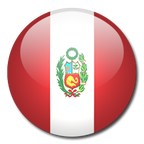International Headteacher
Menu
|
Full name: Republic of Peru
Population: 29.4 million (UN, 2011) Capital: Lima Area: 1.28 million sq km (496,225 sq miles) Major languages: Spanish, Quechua, Aymara Major religion: Christianity Life expectancy: 72 years (men), 77 years (women) (UN) Monetary unit: 1 nuevo sol = 100 centimos Main exports: Fish and fish products, copper, zinc, gold, crude petroleum and by-products, lead, coffee, sugar, cotton GNI per capita: US $4,700 (World Bank, 2010) Internet domain: .pe International dialling code: +51 |
|
Peru's rich and varied heritage includes the ancient Incan capital of Cuzco and the lost city of Machu Picchu. The country boasts spectacular scenery, including Lake Titicaca, the world's highest navigable lake.
A growing number of visitors are being drawn to its variety of attractions, such as its archaelogical treasures, the Andes mountain range and the Amazon rainforest, which makes up about half the country. Business Dress In Peru, it is important to dress professionally and conservatively. Men are expected to wear suits with ties and women pant suits, skirts or dresses. Another factor in dressing for success in this country is to have shined shoes. Business Meetings In Peru, the lunch time is later than the standard American noon lunch hour. The Peruvian lunch hour is from 1:00 – 2:00 pm or from 2:00 – 3:00 pm. In their culture, the people have a “polychromic view of time” however it is expected that “foreigners arrive to a meeting on time.” (Source: Luis E. Ore from ORASI Consulting Group) Foreigners should expect that their Peruvian hosts may arrive later to the meeting. In their absence at the beginning of the lunch or dinner meeting, the Peruvian hosts make certain that guests are served a Pisco Sour. That is the Peruvian national drink. As a foreigner, it is vital that one tries to enjoy the local cuisine and traditions as this will open up the communication channels with the Peruvian people. Communication When conducting business in Peru, it is important to make a genuine effort to ask about the culture and also respectfully appreciate the differences that you see. Business people can discuss some of the following topics: culture, local cuisine as well as history. Peruvian society operates under a hierarchical culture. For example, people are addressed as Señor (Mr.) or Señora (Mrs.) and then his or her last name. According to Mr. Ore from the ORASI Group, attorneys are called “Drs.” and a male engineer would be called “Señor Ingeniero” (last name). Be certain to offer a formal handshake in a business setting. Do not use someone’s first name in a formal setting unless the person invites you to do so. Language While communicating and conducting yourself in a business setting, remember to be respectful of others and always abide by the “Golden Rule”—treating others as you want to be treated. You may not speak fluent Spanish. However, it is seen as a sign of respect when you make an effort to speak a few words in Spanish. For example, you can utilize some of the following phrases: Hola (hello), Buenos Dias(good morning), Buenos Tardes (good afternoon) and Buenos Noches (good evening). Business Etiquette Peruvian society is collectivistic and people have a relationship oriented perspective which emphasizes interdependence amongst their fellow Peruvians. When doing business in Peru, it is important to note that building relationships and cultivating rapport with others is more important than trying to close a business deal. In regard to locals in the urban areas, they approach business negotiations with a more competitive goal oriented perspective than those in the rural Peruvian areas. In the rural localities, the people tend to be more cautious when entering business dealings and want to learn about the foreigner’s culture and traditions first. Generally speaking, Peruvians as a whole, tend to be more indirect in their communication patterns. However, those in the urban areas do have more direct methods of communicating. Gift Giving There are no distinctive traditions in regard to gift giving. |
information provided by www.bbcnews.co.uk

